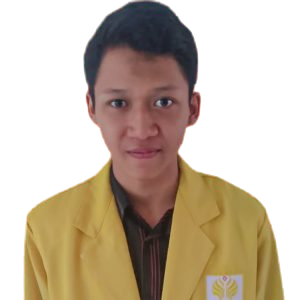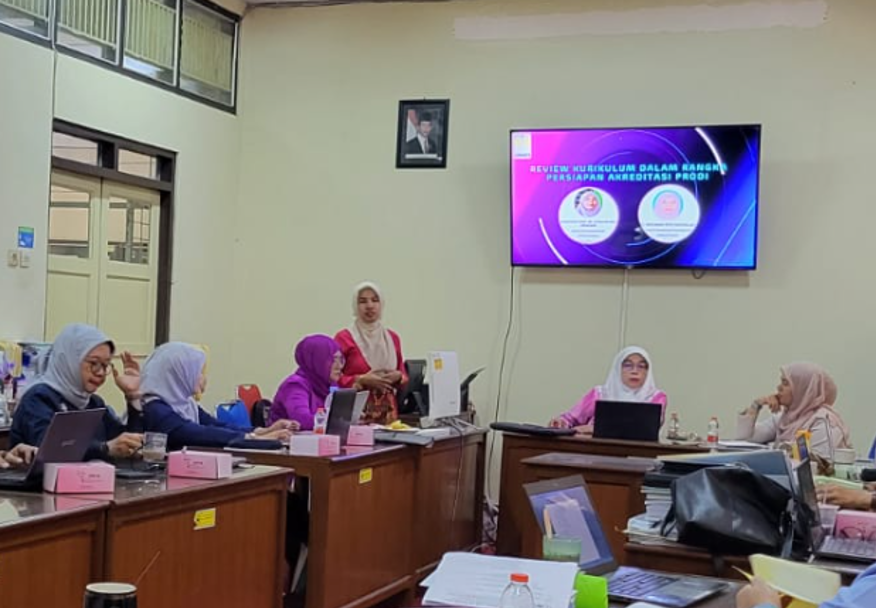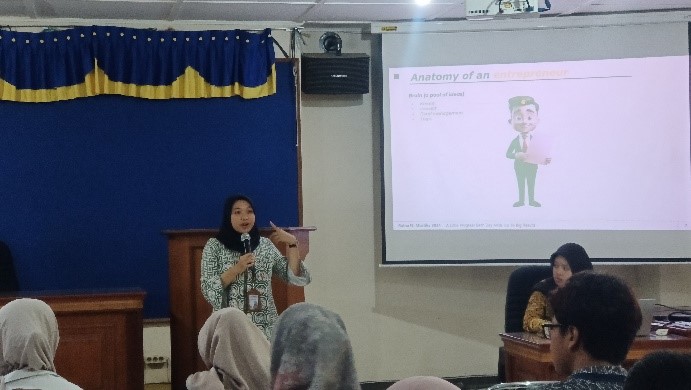
“Chemistry student of the 2018 batch. Active writer and participant in various organizations both within and outside the campus. Currently active in the Islamic Spiritual Sie (SKI) Chemistry, Forum of Islamic Students (FMI) FMIPA, Unit of Islamic Religion Mentoring (UMAI) UNNES, Excellent Writing Club (EWC) VDMI Scholarship and Young Leader Beneficiary (YouLead) of Dompet Dhuafa Regional Semarang.
Some time ago, I was surprised by the data from the survey conducted by the Central Statistics Agency (BPS) on the Behavior of Society during the COVID-19 Pandemic, which was conducted from September 7-14, 2020. In their release, BPS announced that 17 out of 100 respondents in the survey stated that it was highly unlikely or impossible for them to be infected with COVID-19. The percentage, when viewed according to education level, showed figures of 33.69% for elementary school graduates, 32.58% for junior high school graduates, and the rest for high school and university graduates. From these data, while shaking my head, I wondered how it is possible that there are still Indonesian people who believe they are “immune” to this virus, even though we haven’t found a cure or even a vaccine yet? What factors underlie their assumption? Is it due to their ignorance or is it because of the flaws in our education system that we have been following all this time? From these puzzling questions, I finally unconsciously found the answer a while ago. Actually, this is not the final answer, but at least it can alleviate my headache. I found the answer after reading an old news article on the Tekno Tempo website dated Tuesday, January 29, 2019, titled “Getting to Know Japan’s Vision of Society 5.0: Integration of Virtual and Physical Spaces.” At first glance, the news article tells the story of Japan’s efforts to balance economic progress with social solutions through a system that highly integrates virtual and physical spaces. What’s even more impressive is that this idea was supported by the then Prime Minister of Japan, Shinzo Abe, and was even proposed directly in the Fifth Science and Technology Basic Plan as the future society envisioned by Japan. From the various crazy ideas of the Japanese society mentioned earlier, I concluded that they can achieve such progress because they have succeeded in integrating science into everyday life. So, what does this have to do with Indonesian society that considers themselves “immune” to COVID-19?
Actually, it has no influence whatsoever on them, but from the assumption of being “immune,” it actually motivates me to further promote science in everyday life. From them, I realized that Indonesian society is still far behind Japan, but it is not impossible that in the next 25-50 years, we will catch up with or even surpass them. So, how can we do it? The way is through promoting science in everyday life. One way to do this is through Ethnoscience (Indigenous Science). Ethnoscience (Indigenous Science) is the activity of transforming/reconstructing the knowledge of the community that has been passed down through generations into scientific knowledge that can be used in teaching natural sciences in formal/informal/non-formal school settings as well as in the general public. The observable knowledge of the community includes customs, habits, behaviors, arts, religion, language, myths, and symbols. This idea has actually been conveyed several times by my lecturers, Prof. Dr. Sudarmin, M.Si, and Drs. Woro Sumarni, M.Si. After considering it, I realized that this idea makes sense and should be tried. In fact, if I may be honest, our ancestors were not any less “intelligent” than other nations around the world. Even back in junior high school, when studying Indonesian history was still fresh in my memory, my teacher explained that our Indonesian ancestors at least possessed some high-level skills that led to a more advanced civilization compared to other nations.
One of those skills is the ability to wisely utilize whatever is available in nature and process it into sophisticated technology of its time. For example, let’s take a look at various aspects of life. In terms of weapon technology, we can consider the Keris. Just imagine how a hard meteorite stone could be crafted into a Keris weapon with intricate patterns and still remain sharp when used, not inferior to the Japanese Katana sword. Then, in terms of music art, we can take Gamelan as an example. Just think about how hard metals, when forged, produce ear-piercing sounds, but when carefully crafted, they create a set of Gamelan instruments that produce enchanting and harmonious melodies, not inferior to Western symphony music. And in terms of food technology, let’s consider the making of tempeh. Just imagine how raw soybeans, when processed with the right techniques, combined with the addition of yeast and left to ferment, eventually become delicious and highly nutritious, not inferior to Italian Mozzarella cheese. The utilization of natural materials mentioned earlier actually involves natural science (science) that we have been learning together. Actually, this science is not unfamiliar and has been ingrained in the blood of the Indonesian people. So, why does it feel difficult now when we study science? Have all the scientific knowledge inherited from our ancestors disappeared like memories with an ex-partner? Have all our scientific memories and products always been led and followed the Western world?
The answer to the previous question is that during the process of learning science, both educators and ourselves have never been willing to explore this local wisdom as a perspective in studying it. We have always been busy “dissecting” science only from a microscopic, macroscopic, and symbolic point of view without considering our own culture as the easiest approach to teaching science. However, all these aspects are integral visions that cannot be separated one by one. To simplify for the readers, I will illustrate it through the field of study I have pursued, which is Chemistry. As a macroscopic example, why is Titanium, known as one of the strongest metals known to mankind throughout its history, easily malleable and shapeable according to our desires? Usually, Chemistry teachers provide an explanation based solely on the microscopic aspects of its chemistry, without considering a cultural perspective (Indigenous Science) related to its daily life. Their answers are often based on abstract theories that are difficult for students to grasp. It’s as if they close their eyes and fail to see the examples of authentic Indonesian products that use Titanium as a raw material. Yet, Indonesia has the Keris as one of its representations. In fact, researchers from ITB, UGM, and BATAN have long revealed the fact that Keris artifacts from the Majapahit Kingdom and the Islamic Mataram Kingdom, when analyzed using gamma-ray spectrometry, contain Titanium metal that can be found in every intricate pattern. This is just an example in one field. There are probably many more aspects that we have yet to discover and convey. Our Science teachers should be aware of this scientific fact, but in reality, they still teach science using the same monotonous standards.
The unfortunate consequence of continuously neglecting this grand knowledge is that Indonesian students end up merely having superficial knowledge without truly understanding the greatness of what their nation possesses. This will have a negative impact on their psychological well-being. One of the consequences is that they lack confidence in their own cultural wisdom. If this continues, I believe that all Indonesian cultures could be at risk of extinction. Therefore, the cultural perspective (Indigenous Science) must be included as an integral perspective when studying science, whether we like it or not. However, I do not deny that not all aspects of the cultural perspective (Indigenous Science) are suitable for studying science. Therefore, our teachers need a high level of intelligence to translate each subject matter they teach to their students. At least, learning science with a cultural approach through suitable materials will make Indonesian students realize that studying science is not just about understanding natural phenomena and getting an A grade on exams. There is a noble essence within it because learning science is an effort to remember and derive wisdom from the grand civilization heritage of the Indonesian ancestors. Learning science is an effort to defend the nation’s existence with all its diversity. Most importantly, learning science is an effort from us, the servants of the Almighty God, to become wise stewards capable of managing this world. If we can harness this potential properly, I believe that within the next 25-50 years, we will catch up with or even surpass all the nations in the world. It starts with us, and one way to do it is by popularizing science with a cultural approach in our daily lives. Through this method, let us awaken Indonesia. It is time for Indonesia to rise from its slumber and become a powerful nation leading the world.
As a closing statement, it is indeed true what was once said by the Turkish writer, Iskender Pala, in his work “Babylonian Society,” “Hide this knowledge and science (referring to Indigenous Science) in myths and superstitions. Because humans are not yet ready to make it beneficial. This knowledge can be dangerous if it falls into the wrong hands.”
Based on that statement, I assume that perhaps the ancestral knowledge of the Indonesian people is still too heavy for us to contemplate. Hopefully, our scientific thinkers and educators will soon realize the importance of this knowledge heritage. Through this approach, may a Renaissance era emerge to illuminate the lives of the Indonesian people. May this approach lead Indonesia to become a culturally rich and self-reliant nation in the future. Amen.




